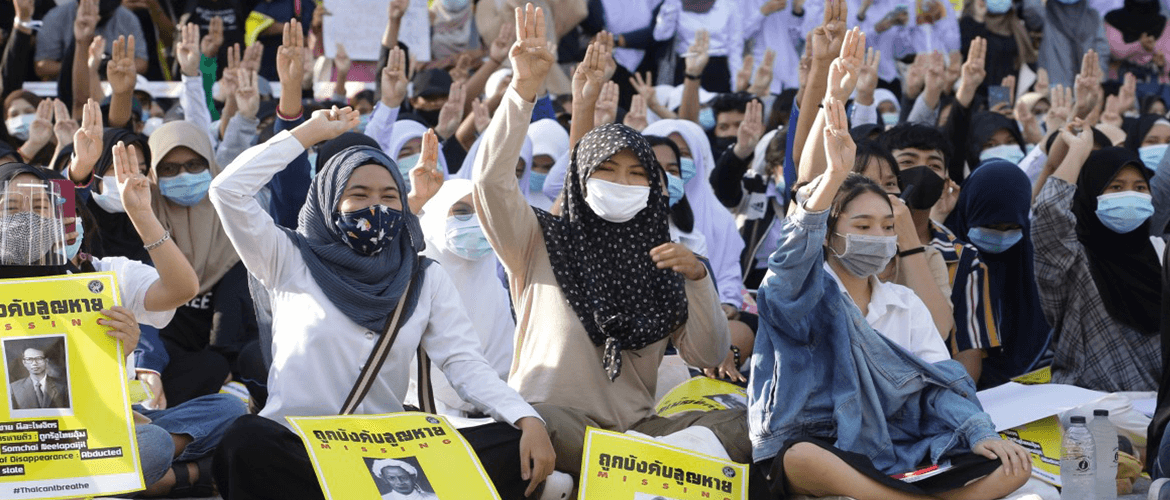Thailand: Charge of the Youth Brigade
September 3, 2020 | Expert Insights
Thailand’s protests, the largest since the 2014 coup, made up of a largely young demographic is shaking up a stultifying political order, much like other citizens’ movements demanding reform, such as Hong Kong, Taiwan, and further on in Lebanon and Chile.
On August 16, more than 10,000 Thais came out on the streets demanding a change in government and even attacked the hitherto forbidden and taboo subject — the monarchy. Such public demands for change are unprecedented in the country’s history.
A widely supported anti-government movement first emerged in the last months of 2019, after courts banned Future Forward, the most vocal party opposing the government of incumbent Prime Minister General Prayut-Chan-o-cha. An online protest simmering during the lockdown has now spilled over into the streets with almost daily demonstrations.
Though the Thai government has been effective in containing the coronavirus outbreak, with one of the lowest cases and death toll in Asia, citizen activists have decried the stringent emergency and quarantine measures that were in place for citizens, while the armed forces were allowed to disregard them.
The protests lack central leadership, and different interest groups have been coordinating marches through social media. They share a common grudge against the powerful military and its proxies in the government.
WHAT THEY DEMAND
Three key demands have invigorated the Thai push for democratic reforms-dissolution of the parliament, end to harassment of opposition activists and constitutional reforms.
The military is a powerful institution and Thailand has dubious distinction of seeing the largest number of military coups in SE Asia. After the military coup of 2014, General Prayut scrapped the constitution the same year and had the military write a new charter that increased the king's powers and established the power of the pro-military royalists. This deeply embedded alliance between the monarchy and the military (which has also served to increase the wealth gap in Thailand) is now being denounced by the protesters as "an enemy to the principles of democracy", threatening to push the country closer towards an absolute monarchy.
The protesters have also pressed for reforms in the powerful Thai monarchical institution. These include curbs on King Maha Vajiralongkorn’s constitutional powers and his authority over the armed forces and domestic politics. Yet, protesters have also strongly emphasised that they do not want to abolish the institution. The monarchy is generally a taboo subject in Thailand because of the harsh and repressive ‘lese-majeste’ laws which criminalise criticism of the king and other senior royals and have been wielded extensively to silence and jail citizens. In this context, the protests are astounding for there has not been such a direct and public challenge to the Thai monarchy in decades.
Economic variables largely compound the demand for political change. The Thai economy has been in free fall in recent months with the crucial Thai tourism sector largely dormant. The economy is estimated to have contracted by about 12.2 per cent in the second quarter of the year, its worst downturn since the time of the Asian financial crisis. “The severe economic downturn, combined with Thailand’s persistently high inequality and still rigid economic and social hierarchies — it is one of the most unequal countries in the world — animates opposition, especially younger people graduating from university, struggling to find work, and rebelling against traditional hierarchies,” said Pavin Chachavalpongpun of the Council on Foreign Relations.
Other factors include allegations of government corruption and the concentration of state power by wealthy elites. The disappearance of an anti-government activist in Cambodia and the crackdown on political opponents like the citizen-backed Future Party has also fuelled disaffection.
GOVERNMENTS BALANCING ACT
The government — comprised mostly of conservative, military and royalist figures — is walking a tight rope. It is afraid to mobilise repressive and harsh measures against protesters for fear of further backlash by encouraging both local and international support for the protests, and invoking international criticism. On the other hand, not taking strong action also serves to embolden protesters and prolong the movement, as well as serving to undermine the monarchy.
According to Thai newspapers like the Bangkok Post and The Nation, the government has announced that citizens are allowed to voice their dissent, and General Prayut has said he seeks dialogue with the protesters. But, the kingdom’s long history of brutal crackdowns leaves cause for concern about an eventual violent response if demonstrations continue to grow in size and forcefulness. Even though the king has apparently requested no prosecutions, for now, under the country’s strict ‘lese-majeste’ laws, at least ten pro-democracy protesters have been arrested on other charges, including sedition, which carries a sentence of up to seven years.
Assessments
- It remains to be seen whether sustained protests will bring about concrete changes to the Thai monarchy and government under Prime Minister Prayut. Unless economic reforms are instituted, protests demanding political change will continue.
- As part of the ‘Look East Policy’, India has maintained strong strategic bilateral relations with Thailand, including in the areas of maritime policy and security cooperation. However, the current upheaval might bring in proxies, like China, into the country, making it imperative to track political developments in Thailand closely.



Comments